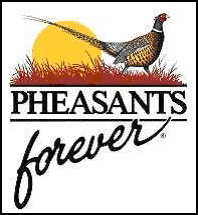
Swift County, MN –(Ammoland.com)– Pheasants Forever recently hired William Clayton for the new position of farm bill biologist in Swift County, Minnesota.
Clayton will work in a joint capacity with Pheasants Forever, Swift County Soil and Water Conservation District (SWCD), Minnesota Board of Water and Soil Resources, and the Natural Resources Conservation Service (NRCS) to coordinate and implement conservation provisions of the federal farm bill and other related wildlife conservation programs.
“Pheasants Forever’s Farm Bill Biologist program is a tried and true method for implementing quality habitat across Minnesota’s landscape,” said Eran Sandquist, Pheasants Forever’s Northern Minnesota regional wildlife biologist.
“Thanks to the hard work of our farm bill biologists, Minnesota will continue to be a leader in landscape management and outdoor recreation.”
A New London native, Clayton recently graduated from North Dakota State University (NDSU) with a B.S. in Natural Resources. During college, Clayton gained extensive conservation management experience working for Prairie Restorations, Pope/Swift County Soil and Water Conservation District, and New London-Spicer High School where he was Gary and Cindy Westby’s Minnesota Department of Natural Resources student intern.
Clayton grew up hunting deer, turkeys, ducks, geese, pheasants and rabbits. His father worked for the Department of Natural Resources as a naturalist in Sibley State Park. While he was introduced to the idea of conservation at an early age, it wasn’t until the Clayton family enrolled approximately 100 acres of their land into the Conservation Reserve Program (CRP) that his passion for conservation was developed. Within a few years, Clayton saw first-hand the benefits and importance of conservation practices and knew he wanted to pursue a career in conservation.
“I believe that conservation and proper land management is important in sustaining a working and healthy ecosystem that can be utilized by hunters, non-hunters, and wildlife alike. It is from this idea that I thoroughly enjoy working with existing resources to improve what we have,” noted Clayton. “This idea lives at the core of Pheasants Forever and Quail Forever, and I am excited to help improve wildlife habitat in Minnesota.”
Farm bill biologists work to accelerate enrollment in the suite of U.S. Department of Agriculture (USDA) farm bill conservation programs. Additionally, they add wildlife technical assistance in USDA offices to assist the Natural Resources Conservation Services (NRCS), Farm Service Agency (FSA), and other conservation partners with delivering conservation programs to landowners. These biologist positions wouldn’t be possible without funding from state agencies, USDA-NRCS, local Pheasants Forever and Quail Forever (QF) chapters, soil and water conservation districts, the Environment and Natural Resources Trust Fund as recommended by the Legislative-Citizen Commission on Minnesota Resources, and other partners.
“We are excited to have William join our conservation staff in Swift County. I encourage producers and landowners to give him a call, so he can discuss with them the various programs that are available to meet their conservation needs,” said Randy Schmiesing, NRCS Benson Field Office’s district conservationist.
Minnesota is home to 74 Pheasants Forever chapters, two Quail Forever chapters, and combined over 25,000 PF/QF members.
About Pheasants Forever
Pheasants Forever, including its quail conservation division, Quail Forever, is the nation’s largest nonprofit organization dedicated to upland habitat conservation. Pheasants Forever and Quail Forever have more than 145,000 members and 745 local chapters across the United States and Canada. Chapters are empowered to determine how 100 percent of their locally raised conservation funds are spent, the only national conservation organization that operates through this truly grassroots structure. Pheasants Forever is dedicated to the conservation of pheasants, quail and other wildlife through habitat improvements, public awareness, education and land management policies and programs.
